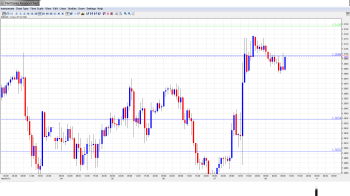EUR/USD has started the trading week on the left foot as German and French numbers were weak. EUR/USD is testing the 1.30 line, after the pair lost close over a cent on Friday. In Monday’s releases, German Trade Balance fell well below the estimate, while French Industrial Production posted a sharp decline. There are no releases out of the US today.
Here is a quick update on the technical situation, indicators, and market sentiment that moves euro/dollar.
EUR/USD Technical
- Asian session: Euro/dollar touched a high of 1.3025 and consolidated at 1.3006. In the European session, the pair is unchanged.
- Current range: 1.3030 to 1.3100.
Further levels in both directions:
- Below: 1.3000, 1.2960, 1.2880, 1.2805, 1.2746, 1.27, 1.2660 and 1.2587.
- Above: 1.3030, 1.3100, 1.3130, 1.3170, 1.3255, 1.3290, 1.3350, 1.34, 1.3486 and 1.3588.
- 1.3130 is the next resistance line. 1.3170 remains a key line of resistance.
- The pair is testing on 1.30 on the downside. The next support level is 1.2960.
Euro/dollar testing 1.30 line – click on the graph to enlarge.
EUR/USD Fundamentals
- 7:00 German Trade Balance. Exp. 17.9B. Actual 15.7B
- 7:45 French Industrial Production. Exp. -0.1%. Actual -1.2%
For more events and lines, see the Euro to dollar forecast
EUR/USD Sentiment
- ECB maintains interest rate: The ECB left interest rates unchanged on Thursday, keeping the benchmark rate at 0.75%, and the deposit rate at 0%. Although ECB head Mario Draghi mostly repeated what we’ve heard before, the markets were nonetheless pleased, and the euro shot up, gaining over one cent. Draghi reiterated that the Eurozone economy is struggling but things should turn around later in the year. He also added that the decision to maintain rates was not unanimous, as there had been calls to lower rates in order to boost lackluster growth. Draghi also tried to downplay the crisis in Italy, but called on member countries to implement needed structural reforms, a clear hint to Italy to continue with austerity measures in order to get its fiscal house in order.
- Euro flies,then falls: The euro took traders for a roller coaster ride last Thursday and Friday. The continental currency shot up after the ECB maintained interest rates at 0.75%, and gained over one cent against the US dollar. On Friday, the euro coughed up almost all of those gains, closing the week just under the 1.30 level. The catalyst for the sharp drop was outstanding US employment numbers, which gave a boost to the dollar. As well, the euro was hurt by German Industrial Production, which came in at a flat 0.0%, well below the market estimate. The euro is trying to gain its footing as we begin the new trading week, as it trades just above the 1.30 level.
- US employment numbers sparkle: US employment indicators enjoyed an outstanding week. Unemployment Claims dropped to 340K, well below the estimate of 354K. Non-Farm Employment Claims hit 236 thousand, smashing past the forecast of 162 thousand. The Unemployment rate fell nicely, dropping to 7.7% from 7.9%. The strong figures helped the dollar post sharp gains against the euro at the end of the week, and we could see the greenback make further gains if US number numbers continue to shine.
- Italian political stalemate continues: The political crisis continues to fester Italy, paralyzing the Eurozone’s third largest economy. With Italy facing serious economic difficulties, the country can ill-afford to wait as the political leaders continue to fight with each other. Center-left leader Pier Luigi Bersani has expressed his readiness to form a minority government with populist leader Beppe Grillo. Grillo, the unpredictable head of the 5 Star Movement, has so far refused to join forces with any other party, and seems content to force new elections. Parliament will sit for the first time next week, and President Giorio Napolitano is expected to begin consultations with party leaders on March 19, as efforts to sort out the political paralysis shift into high gear.
- Spain asks for flexibility to reduce deficit: At a meeting of European finance ministers earlier this week, Spain asked for more time to reduce its budget deficit. Economy Minister Luis de Guindos said Spain had lowered its deficit and restored its credibility with international credit markets. He pointed to the fact that Spain has reduced its budget deficit from 9% of GDP in 2011 to under 7% in 2012. However, this still falls well short of the EU limit of 3%. Theoretically, the EU could halt aid to Spain due to its lack of compliance, but such a drastic step is very unlikely. The bloc wants to see Spain regain its financial footing, and some compromise will likely be reached.
- Fed may wind up QE: The US has posted some solid economic releases of late, and this has rekindled discussion as to whether the Fed might wind up its current round of QE, which involves the purchase of $85 billion in assets each month. In particular, employment numbers were very sharp last week, as Unemployment Claims beat expectations, Non-Farm Employment Change was excellent and the Unemployment Rate dropped. Although Fed Chair Bernard Bernanke and Vice-Chair Janet Yellen have stated that QE will continue, evidence of a stronger recovery will put pressure on the Fed to consider winding up or modifying the current asset purchase program.

